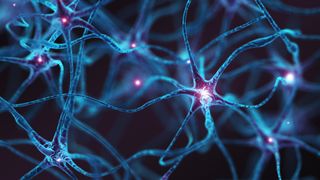These 3 neurons can be under the influence of food intake
The drive to eat may be controlled by a very simple circuit in the brain, new research in mice suggests.
Only three types of brain cells work together to suppress or enhance appetite, driving mice to eat less or more food, the study found.
First, specialized neurons detect “hunger hormones” that tell whether an animal is full or hungry. These neurons then control the activity of neurons in a different part of the brain, which, in turn, controls a third group of neurons in the jaw: These nerve endings control the movements necessary for chewing .
The three-dimensional circuit works like a reflex, except it doesn’t require a single thought to trigger it – like moving your hand away from a hot object. In this case, the stimulus that produces the reflex is a hormone that indicates hunger, and the resulting action moves the jaw to chew.
Related: ‘This is little-known territory’: Scientists reveal the brain’s “fear circuit” works differently than we thought.
The new study, published Oct. 23 in the newspaper Natureincluding only mice, and the three-phase cycle has not yet been identified in humans. However, if found in humans, this discovery could “change the narrative” on obesity, the authors behind the study argue.
“Controlling how much we eat and how often we eat doesn’t really depend on your decision, it just happens – it’s a simple cycle,” Christine Kossestudy lead author and research fellow at Rockefeller University in New York, told Live Science.
In recent decades, medical organizations have identified obesity as a chronic disease with multiple causes, including genetics. Previously, it was considered to be the result of personal decisions about eating. A new study adds evidence to the idea that physical differences cause obesity.
The new study also helps unify several existing theories about hunger.
The first is known as “set point theory.” Some scientists think that people generally have a body weight set by their genes and their environment. As the theory goes, the human body tries to maintain a weight of ‘ the body does not change, even if it eats more or less food than it needs, there are different physiological mechanisms that help to adapt to these changing levels of calories.
But if these methods fail, people may gain or lose weight.

For example, after you’re full, fat cells and cells in the gut release hunger-controlling hormones that signal the brain to stop eating. These shows are kicking about 20 minutes after eating you are full. However, if this hormone signaling is disrupted for some reason, people can become very hungry even if they don’t eat enough. In some cases, this can cause people to overeat until they being very fat.
Previous research has shown that neurons in a part of the brain called the hypothalamus play a role in appetite controland are viewed by weight loss drugs in the same class as Ozempic. In addition, the reduction of a protein called brain-derived neurotrophic factor (BDNF) in the brain are associated with obesity in animals and humans.
A new study connects the dots between these findings.
In their experiments, Kosse and their colleagues found that neurons in the hypothalamus that produce BDNF were injected into the brains of mice that became obese after being fed a high-fat diet. This means that these BDNF-producing neurons act in response to body weight in order to suppress appetite in mice.
To test this hypothesis, the team turned these BDNF neurons on and off. When the neurons stopped working, the mice ate about 1200% more food than normal, and they made chewing movements even when there was no food available to them. In some cases, they even started trying to eat things like wood, suggesting that this reaction is automatic.
On the other hand, when the neurons were activated, the opposite effect occurred: The mice stopped eating and did not make chewing movements. Once the team realized these BDNF neurons were changing the key in the brain, they identified two other types of neurons involved in this circuit.
Kosse believes that it’s possible that we humans have a similar hunger control mechanism in our brains.
Next, the team wants to see if this cycle changes in different emotional states, such as anxiety.
Always ask yourself why some people build muscle more easily than others or why spots appear in the sun? Send us your questions about how the human body works community@livescience.com with the subject “Health Desk Q,” and you can see your question answered on the website!
#neurons #influence #food #intake